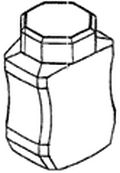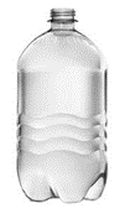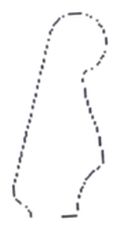- with readers working within the Telecomms industries
Shapes can function as a clue to identify the source and differentiate between products of different companies. While browsing a store shelf, consumers often identify a product by its shape before even noticing its label. Shape marks offer a beneficial avenue to safeguard product designs, packaging, and containers in both Austria and the entire European Union.
Find the German version of this article below
What is a shape mark?
Shape marks or three-dimensional marks are trademarks consisting of a three-dimensional shape. By registering a shape mark, the appearance of a product can be protected if it is capable of distinguishing the goods or services of one undertaking from those of others (=acting as a trademark). You will likely recognise the following shapes as indicating products originating from a certain company:

EUTM 000031237

EUTM 000137406

AT 279975
Protectability of shape marks
Every physical product has a shape, but not every shape can act as a trademark.
According to EU case law, a shape is protectable as a trademark if it departs significantly from the norm or from the customs of the sector concerned. In such a case it is recognised as a trademark, i.e. as an indication of origin.
If, on the other hand, the shape is rather common, the applicant must prove that due to intensive use the relevant public has learned to recognise it as an indication of origin (so-called acquired distinctiveness or secondary meaning). The European Union Intellectual Property Office (EUIPO) considered such a proof of acquired distinctiveness necessary for the following rather common, but due to the use distinguishable, shape of a bass or guitar head:

EUTM 003318474
It should be noted at this point that trademarks which consist exclusively of shapes of goods that are necessary to obtain a technical result are excluded from trademark protection under all circumstances, even if they have acquired distinctiveness through use.
Representation of the shape
According to EU case law, a trademark must be presented on the register in a clear, precise, self-contained, easily accessible, intelligible, durable and objective manner. The competent authorities and the public must be able to determine with clarity and precision the subject matter of the protection afforded to the trademark owner.
Thus, before registering a shape mark, representations should be arranged that wholly and accurately reflect the shape. Today's multimedia registers allow for different types of representations (depending on the register) such as photos, graphic representations/sketches or 3D models (X3D).
If a representation contains elements for which no protection is claimed, applicants may disclose this by depicting such elements in broken lines.
Additionally, Austrian and EU trademarks can also be given descriptions (e.g. to explain the illustrations).
Technical requirements within the Austrian and EU application process
Currently, the Austrian Patent Office only accepts digital submissions for shape marks if they come in JPEG file format. The maximum file size is 2 MB. Applications may also be filed in paper format, in which case six identical mark images on paper (max. size: 8 x 8 cm side length) must be submitted.
The EUIPO accepts submissions in JPEG, OBJ, STL and X3D file formats. The file size must not exceed 20 MB. To ensure a complete view of the mark, up to six perspectives of the same shape may be submitted in a single JPEG file (or in hard copy on an A4 sheet).
Summary
Shapes may serve as an indication of origin and distinguish products from one undertaking from those of another. When looking at a store shelf, consumers sometimes recognise the shape of a product much earlier than its label. Shape marks are a good option to protect product designs, packaging and containers in Austria and the entire European Union. Assessing whether the shape is protectable as a trademark and choosing appropriate representations are extremely important when registering this type of mark.
Was sind Formmarken?
Formmarken oder auch dreidimensionale Marken sind Marken, die aus einer dreidimensionalen Form bestehen. Dadurch kann das Aussehen eines Produkts, das für sich auch als Marke wirken kann, geschützt werden. Vermutlich werden Sie zB folgende Formen als Hinweis auf die Herkunft des Produkts aus einem bestimmten Unternehmen wahrnehmen:

EUTM 000031237

EUTM 000137406

AT 279975
Schutzfähigkeit einer Formmarke
Jedes physische Produkt hat eine Form, aber nicht jede Form ist eine Marke.
Eine Form ist nach der Rechtsprechung dann als Marke schutzfähig, wenn sie erheblich von der Norm oder der Branchenüblichkeit abweicht und (daher) als Marke – dh als Herkunftshinweis – erkannt wird.
Trifft das nicht zu, weil es sich zB um eine eher gewöhnliche Form handelt, muss die Anmelderin nachweisen, dass die beteiligten Verkehrskreise die Form aufgrund der intensiven Nutzung mittlerweile als Herkunftshinweis erkennen (sog erworbene Unterscheidungskraft bzw Verkehrsgeltung). Einen solchen Nachweis hielt das Amt der Europäischen Union für Geistiges Eigentum (EUIPO) etwa für folgende – eher gewöhnliche, aber aufgrund der Nutzung zuordenbare – Form eines Bass- bzw Gitarrenkopfes für erforderlich:

EUTM 003318474
Zu beachten ist, dass insbesondere rein technisch bedingte Formen keinesfalls als Marke schutzfähig sind.
Abbildung der Form
Nach der Rechtsprechung muss jede Marke im Register eindeutig, präzise, abgeschlossen, leicht zugänglich, verständlich, dauerhaft und objektiv dargestellt werden (es muss klar sein, für welchen Gegenstand dem Markeninhaber Schutz gewährt wird).
Vor einer Anmeldung sollten daher Abbildungen abgestimmt werden, die die Form korrekt und vollständig wiedergeben. In den heutigen Multimedia-Registern sind – je nach Register – unterschiedliche Darstellungsvarianten denkbar, wie etwa Fotos, grafische Darstellungen/Skizzen oder 3D-Modelle (X3D).
Falls in den Abbildungen Elemente vorhanden sind, für die kein Schutz beansprucht wird, können diese durch gestrichelte Linien gekennzeichnet werden.
Zusätzlich können bei österreichischen und Unionsmarken Beschreibungen hinzugefügt werden (etwa zur Erklärung der Abbildungen).
Technische Voraussetzungen in Österreich und in der EU
Das österreichische Patentamt akzeptiert digitale Eingaben für Formmarken derzeit nur im JPEG-Dateiformat. Die maximale Größe einer Datei darf 2 MB betragen. Anmeldungen können auch in Papier erfolgen, dazu sind sechs idente Markenbilder auf Papier (max. Größe 8 x 8 cm Seitenlänge) einzureichen.
Das EUIPO akzeptiert Eingaben in den Dateiformaten JPEG, OBJ, STL und X3D. Die Dateigröße darf 20 MB nicht überschreiten. Um die vollständige Ansicht der Marke sicherzustellen, können bis zu sechs Perspektiven derselben Form in einer einzigen JPEG-Datei (bzw. in Papierform auf einem DIN A4-Blatt) eingereicht werden.
Zusammenfassung
Auch Formen können als Herkunftshinweis wirken und Produkte individualisieren – im Regal erkennen Konsumenten die Form mitunter schon viel früher als etwa eine Beschriftung. Formmarken bieten eine gute Möglichkeit, Produktgestaltungen, Verpackungen und Behältnisse in Österreich und der gesamten Europäischen Union schützen zu lassen. Die Prüfung der Schutzfähigkeit und die passenden Abbildungen sind bei einer solchen Markenart von großer Bedeutung.
The content of this article is intended to provide a general guide to the subject matter. Specialist advice should be sought about your specific circumstances.



